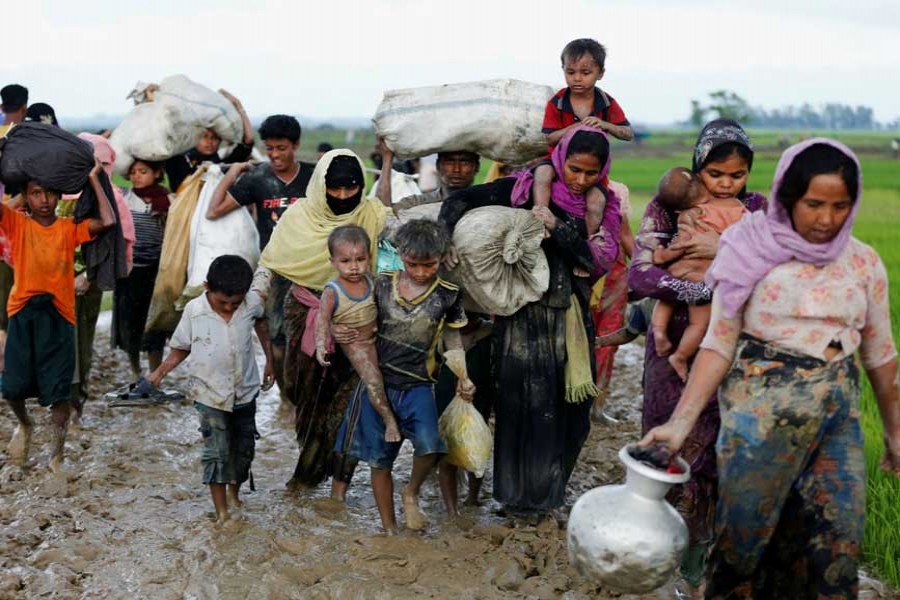In a rare foreign policy move, the Australian government on October 23, 2018 imposed sanction on five powerful and high-ranking Myanmar military officials. They are believed to be suspects for supervising brutal violence against the Rohingya people of Buddhist-majority Myanmar's Rakhine State by army units under their command.
More than 700,000 Rohingya people have been forcibly driven out from their ancestral homes in Rakhine since 2016-2017, which the United Nations (UN) and others termed "ethnic cleansing".
A recent UN report has blamed Myanmar's military for the mass killings, war crimes and crimes against humanity and recommended the top military generals to be put on trial under international law. The Australian sanction comes hot on the heels of critical evidence pertaining to the Rohingya crisis. Notably, the European Union (EU) and the United States have slapped restrictions on top Myanmar generals earlier this year for their alleged link with Rohingya carnage.
Under a defence deal, Australia earlier provided training to Myanmar's army and refrained from imposing sanctions on them. The highest ranking military generals will now be subject to travel prohibitions as well as financial restrictions. It is the toughest ever action by Australia against Myanmar. The objectives are said to be establishing justice and putting pressure on Myanmar government to take back the Rohingyas.
Foreign Minister Marise Payne in a statement said the bans are enforced after the UN has found out that war crimes, crimes against humanity, and likely genocide had taken place in Rakhine. Any person or businesses found to have financial dealings with them will face a maximum penalty of US $ 1.2 million for companies and 10 years jail for persons.
Terming the officers "responsible for human rights violations", Marise Payne also asserted that Australia would continue to support the humanitarian requirements of Rohingya refugees, and closely engage with Myanmar and other partners in the region to encourage efforts towards a long term and durable solution to the crisis.
Australian political leaders have given their support to the government sanction on the Myanmar army generals. Greens leader Richard Di Natale said it's 'about bloody time' Australia put some sanctions on Myanmar. He also tweeted, "These (belated) targeted sanctions against Myanmar are welcome, but now we need to put an end to our military cooperation with them."
The Human Rights Law Centre and the Australian Council for International Development (ACFID) also hailed the sanctions on the military officials, and also called for Canberra to cut all ties with Myanmar.
However, one cannot be fully optimistic about a long-term solution to this catastrophic humanitarian disaster - nor can one be confident that the perpetrators of crimes against humanity will ever be brought to justice. Western sanctions, including that of Australia's, may further push the country towards China and India who have already made huge investments in Myanmar. At the end, geopolitical and financial interests may dominate and the world may never see justice.
Yet, developed nations and the international community can lessen the miseries of those who survived. That is the least they can do for the humanity even if they fail to sufficiently respond to gross violations of human rights.
No doubt, the latest move, although a belated one by Australia conforming to UN endorsements, is a step in the right direction. It's surely in a position to do more. During September 2017 to June 2018, Australia directed about $44 million to meet the humanitarian requirements of Rohingyas living in inhuman conditions in Bangladesh's makeshift Cox's Bazar shelters. This assistance is certainly laudable.
But by this time, the number of Rohingya refugees resettled in Australia is very insignificant. Hence, ACFID CEO Marc Purcell earlier advised 'the Australian government to look at an increase in Australia's humanitarian intake, with specific consideration to vulnerable people who have fled violence and persecution in Myanmar.'
As a developed nation and defender of human rights, much more could have been done by Australia by letting some of the Rohighyas to relocate there. This would have been a win-win result for the Australian economy and the victims of one of the most horrible crimes against humanity.
Dr. Kamal Uddin Ahmed is a former Professor and Chairman, Department of Political Science, University of Dhaka.


